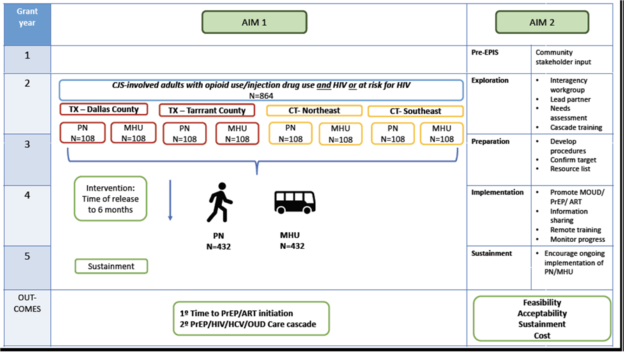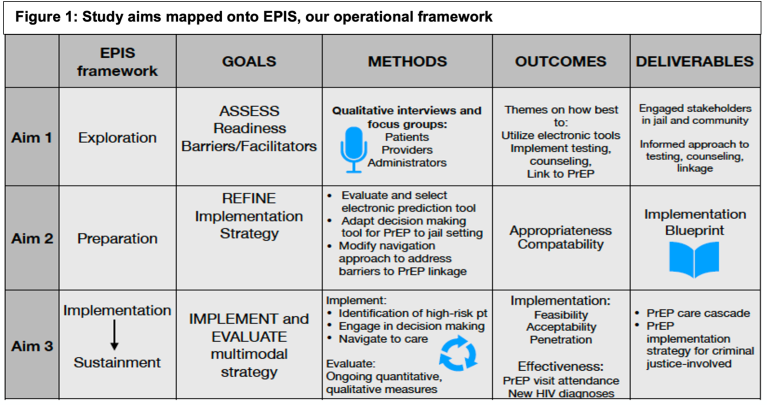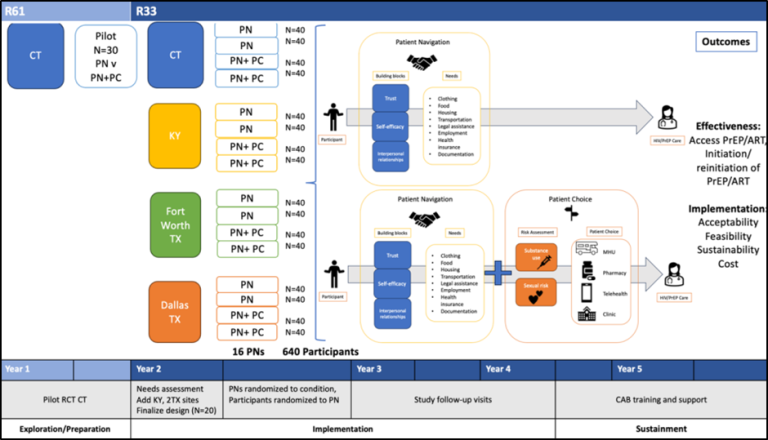ACTION Study

The ACTION study at UT Southwestern Medical Center is a 5-year randomized control trial that compares two models of linking and retaining individuals with recent criminal justice system involvement (within 6 months) to the continuum of community-based HIV and opioid use disorder (OUD) prevention and treatment services. One model is patient navigation, or the use of “near-peer” professionals that may have shared lived experiences (e.g., HIV/OUD/SUD treatment history) with participants. Patient navigators help participants overcome barriers to accessing and engaging in quality care and are integrated as members of the community health care teams. Patient navigation is being compared to the use of a mobile health unit (MHU) that delivers integrated HIV prevention/treatment, OUD & other healthcare services to underserved populations. The ACTION study at UT Southwestern is utilizing the Parkland Homeless Outreach Medical Services Program, or HOMES for short, a program that has provided medical, dental and behavioral health services to Dallas County’s most vulnerable populations for over 30 years.
There are 2 primary aims of the ACTION study:
Aim 1 (Intervention Effectiveness): To compare the effectiveness of the use of patient navigation vs. mobile health unit service delivery on participant length of time to taking initial post-release pre-exposure prophylaxis (PrEP) or antiretroviral therapy (ART) medication within 6 months following release from custody.
Aim 2 (Implementation): To evaluate patient navigation and mobile health unit feasibility, acceptability, and costs.
HOTSPOT

The HOTSPOT study at UT Southwestern Medical Center is a 5-year study with the goal of improving PrEP uptake for people at risk for HIV exiting jail. Dallas County is one of the largest southern HIV hotspots with high rates of new infections and major racial and ethnic disparities in HIV incidence and access to preventive services. PrEP is an effective HIV-prevention intervention, and can reduce new HIV infections by 99%, though one of the biggest challenges for its public health impact is connecting high-risk populations to PrEP care. Barriers at multiple levels can impede access to PrEP for incarcerated persons in the South, such as low knowledge of HIV and PrEP, medical mistrust, limited healthcare access and competing priorities. We plan to implement and evaluate new strategies for improving HIV testing and PrEP for jail populations in Dallas.
There are 3 primary aims of the HOTSPOT study:
Aim 1 (Qualitative Interviews): Assess facilitators and barriers to pre-exposure prophylaxis (PrEP) evaluations in jail and linkage to PrEP at jail release. Conduct qualitative studies with key stakeholders, including patients, providers (in DCJ and in the community), and health care administrators (at DCJ, public health department, and Parkland clinics).
Aim 2 (Development): The development of a protocol to identify candidates for PrEP, including the development of an HIV risk prediction model using electronic health record (EHR) data.
Aim 3 (Implementation): Implement and evaluate the PrEP implementation strategy.
NA-ACCORD
Dr. Nijhawan is the site PI for UT Southwestern/Parkland Health for the North American AIDS Cohort Collaboration on Research and Design (NA-ACCORD)
STOP HIV

The STOP (Shared decision making to Treat Or Prevent) HIV in Justice Populations research study is a randomized control trial that seeks to compare the effectiveness of two patient navigation models of care to evaluate the proportion who initiate PrEP/ART and substance use treatment. A standardized patient navigation (PN) arm will be compared with a shared decision-making model in the form of patient choice (PN + PC) through the offer of a menu of existing community-based health service delivery options. PNs can assist with setting up medical care appointments, provide resources such as clothing, toiletries, and cell phones, and link and refer to services such as housing, employment, and IDs.
Unlocking PrEP
The Unlocking PrEP study is an implementation science study that integrates a PrEP-focused health coach into the existing reentry service provision at Unlocking DoorsÒ, a Dallas-based non-profit. Building on the HOTSPOT study, our overarching objective in this study is to increase PrEP awareness and uptake for individuals with a history of justice involvement in Dallas, Texas.